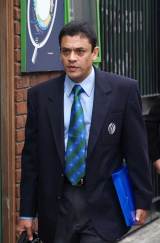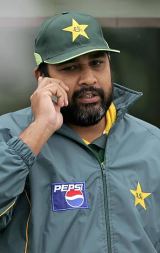Making sense out of chaos
Osman Samiuddin takes a look at the men and the issues behind the Code of Conduct hearing at The Oval
Osman Samiuddin
27-Sep-2006
|
|

|
The centre of the imbroglio is the 56th over of England's second innings on the fourth day. Umpires Billy Doctrove and Darrell Hair, believing that the ball had been tampered with, changed it and awarded England a five-run penalty. Soon after, during tea, Pakistan decided to stage a protest against the decision. Ultimately, the umpires decided that Pakistan's refusal to play amounted to the Test being forfeited. Cue chaos.
Crime and Punishment
Inzamam is facing two charges, of ball-tampering and of bringing the game into disrepute. The former is on behalf of the team; no individual or specific incident of tampering has been highlighted so as captain, Inzamam faces the heat. If found guilty, he faces a fine of between 50 and 100% of his match fee and/or a ban of one Test or two ODIs.
Inzamam is facing two charges, of ball-tampering and of bringing the game into disrepute. The former is on behalf of the team; no individual or specific incident of tampering has been highlighted so as captain, Inzamam faces the heat. If found guilty, he faces a fine of between 50 and 100% of his match fee and/or a ban of one Test or two ODIs.
The latter charge, of bringing the game into disrepute as a result of not leading his team out to play, is potentially more serious. Again, as captain of a side that refused to play, Inzamam is in the dock and if found guilty, he faces a ban of between two and four Tests or four to eight ODIs.
Who's who
Pakistan: Inzamam-ul-Haq, Shaharyar Khan (chairman PCB) and Bob Woolmer (Pakistan coach). Danish Kaneria, Umar Gul and Zaheer Abbas (team manager) have all provided written statements as witnesses.
Pakistan: Inzamam-ul-Haq, Shaharyar Khan (chairman PCB) and Bob Woolmer (Pakistan coach). Danish Kaneria, Umar Gul and Zaheer Abbas (team manager) have all provided written statements as witnesses.
ICC: Darrell Hair and Billy Doctrove, Peter Hartley (third umpire), Trevor Jesty (fourth umpire), Mike Procter (match referee), Doug Cowie (ICC umpires and referees manager).
Judge: Ranjan Madugalle (Sri Lankan ICC chief match referee)
Support cast: Both sides are also backed up be legal representation. The PCB hired a UK-based legal firm, DL Piper, to represent them. Madugalle will be assisted throughout the hearing by the ICC's lawyer David Pannick QC.
Evidence m'lord
The PCB has claimed from the very beginning that there is no proof that ball-tampering occurred, that nothing has been captured on video and no single person caught. This, of course, overlooks conveniently that no evidence other than the ball itself and the umpires' words is needed. Forensic tests on the ball to determine tampering has been suggested while those who have seen the ball - journalists and Pakistan officials - claim that there isn't sufficient evidence to conclusively say tampering has occurred. The ball was 56 overs old and The Oval historically provides a dry, rough surface. Further, a fair few boundaries - and thus advertising hoardings around the ground - had been tonked.
The PCB has claimed from the very beginning that there is no proof that ball-tampering occurred, that nothing has been captured on video and no single person caught. This, of course, overlooks conveniently that no evidence other than the ball itself and the umpires' words is needed. Forensic tests on the ball to determine tampering has been suggested while those who have seen the ball - journalists and Pakistan officials - claim that there isn't sufficient evidence to conclusively say tampering has occurred. The ball was 56 overs old and The Oval historically provides a dry, rough surface. Further, a fair few boundaries - and thus advertising hoardings around the ground - had been tonked.
The disrepute charge seems more straightforward. Everyone knows Pakistan didn't come out to play; though the PCB claimed the protest was meant to last only a few minutes, it lasted nearer 50. Both umpires even went to the Pakistan dressing room to ask Inzamam whether he would come out to resume the Test, to which they received no satisfactory answer and thus decided to forfeit. Mike Procter's testimony will be of particular interest here, if only to establish whether he knew that the Test had been forfeited when he convinced Pakistan to come out and play eventually.
|
|

|
Quite a lot as it happens. The ICC leaked emails from Darrell Hair in the aftermath of the incident in which he offered to resign for US$500,000. Zaheer Abbas has been replaced as manager of Pakistan since the Oval Test. An initial difference in opinion has emerged between the two umpires on when the ball should have been changed. Pakistan were reported in places to be calling up expert witnesses in the form of Geoffrey Boycott, John Hampshire and Simon Hughes. There is history between Hair and Pakistan; Pakistan have rumbled for some time now about Hair's officious attitude and claim they complained officially about him last year. Ehsan Mani, ICC president at the time, denies the claim.
Decision time
The hearing is to be held over two days, behind closed doors and Madugalle has a maximum of 24 hours after it is over to adjudicate on both charges, which means a decision by Friday. However, the PCB can appeal on behalf of Inzamam and Malcolm Speed, ICC CEO, can do likewise on behalf of the ICC if either party is unhappy with the decision.
The hearing is to be held over two days, behind closed doors and Madugalle has a maximum of 24 hours after it is over to adjudicate on both charges, which means a decision by Friday. However, the PCB can appeal on behalf of Inzamam and Malcolm Speed, ICC CEO, can do likewise on behalf of the ICC if either party is unhappy with the decision.
Exactly what that decision will be of course is difficult to know. That hasn't prevented though some speculation. Most, including PCB officials, believe that Inzamam might escape punishment for ball-tampering and face a ban for bringing the game into disrepute. Pakistan sees the ball-tampering charge as the more serious one in any case.
Privately, ICC officials seem to have acknowledged they are in a no-win situation, especially over the disrepute charge. If Inzamam is found guilty - and it is hard to see, even with mitigating circumstances, how he cannot be - then he has to be banned and the options are for one of between two and four Test matches or four to eight one-day internationals.
If Madugalle is lenient, then the ICC will be slammed by many for undermining the tenant that the umpire is the sole arbiter of the laws during a game. If the ban is lengthy - and it is worth recalling that Arjuna Ranatunga was initially slapped with a six-match ban in 1998-99 when he took his side off the field at Adelaide, although that game did resume - then Pakistan are sure to appeal, and the whole affair rumbles on.
Any scenario still leaves the question of what to do with Darrell Hair, particularly for the Champions Trophy, unanswered. He seems to think he is officiating there, the ICC is delaying announcing officials for the tournament, India and Pakistan have officially objected to his presence there and the latter, some reports suggest, have threatened greater action - including a possible pull-out - if Hair stands. In other words, this two-day hearing is unlikely to be the last word on the situation.
Osman Samiuddin is Pakistan editor of Cricinfo